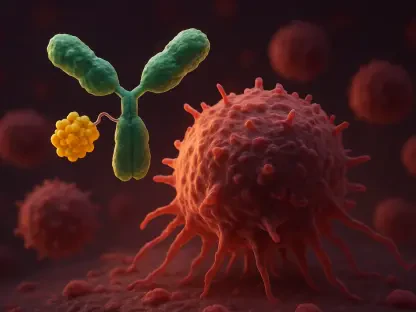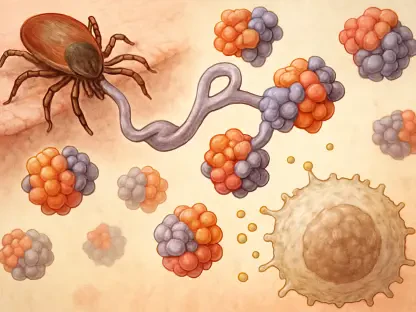The struggle to maintain weight loss is a common challenge faced by many individuals. Despite significant efforts and initial success, the phenomenon of regaining lost weight, often referred to as the “yo-yo” effect, remains prevalent. Recent research has shed light on the underlying mechanisms that contribute to this issue, focusing on the role of epigenetic memory in adipose tissue. This emerging understanding reveals that even after significant weight reduction, the biological memory of obesity can remain embedded within fat cells.
The Concept of Epigenetic Memory
Epigenetic Mechanisms and Gene Expression
Epigenetic mechanisms are processes that influence gene expression without altering the DNA sequence. These mechanisms include DNA methylation, histone modifications, and non-coding RNA molecules. They play a crucial role in regulating cellular functions and maintaining cellular identity. In the context of obesity, these epigenetic changes can have long-lasting effects on fat cells, even after significant weight loss. This means that the body may retain a ‘memory’ of its obese state, making it more likely for individuals to regain weight even after achieving weight loss.
Moreover, epigenetic mechanisms work by switching specific genes on or off, impacting how cells react to environmental stimuli, including diet and lifestyle choices. The persistence of these changes is particularly significant in adipose tissue, which is the body’s primary fat storage site. The study reveals that cells within adipose tissue exhibit lasting modifications that are resistant to change even when the overall body mass is reduced. These findings suggest that sustained efforts and possibly new therapeutic strategies are essential for maintaining weight loss over the long term.
Long-Term Effects on Adipose Tissue
The research highlights that obesity leads to substantial transcriptional and epigenetic changes in adipose tissue. These changes persist long after weight loss, creating a form of epigenetic memory. This memory affects gene activity related to metabolic processes, inflammation, and cell signaling pathways, contributing to a predisposition for weight regain. For instance, genes that were active during a period of obesity may continue to function abnormally, promoting fat storage and inhibiting fat breakdown despite weight loss.
Additionally, the study indicates that these epigenetic modifications can affect the behavior of preadipocytes (precursor cells to adipocytes) as well. This means that new fat cells generated after weight loss could inherit the same obesogenic properties, perpetuating the cycle of weight gain. This ongoing predisposition to regain weight, driven by persistent epigenetic changes, underscores the complexity of obesity and the challenges in achieving long-term weight management. Understanding these mechanisms provides a rationale for developing targeted treatments aimed at resetting the epigenetic memory to support enduring weight loss.
Human and Murine Studies
Human Adipose Tissue Analysis
The study involved analyzing adipose tissue samples from individuals with obesity before and two years after bariatric surgery-induced weight loss. These samples were compared to those from healthy-weight individuals. The analysis revealed significant transcriptional changes associated with prior obesity, indicating a lasting impact on gene activity and cellular functions. This persistence of changes was evident in genes involved in lipid metabolism, inflammatory response, and other critical cellular processes, thus suggesting a metabolic memory retained in the tissue.
Researchers discovered that the transcriptional profile of formerly obese individuals, despite considerable weight loss, did not completely revert to that of healthy-weight individuals. This lingering difference in gene expression patterns points to the robust and persistent nature of obesity-induced epigenetic changes. Such findings have significant implications for the treatment of obesity, revealing that weight loss alone may not be sufficient to erase the complexities of the metabolic memory ingrained in adipose tissue.
Murine Models and Epigenomic Profiling
Murine models were used to further investigate the retained genetic alterations. Mice were exposed to a high-fat diet followed by weight loss, allowing researchers to profile transcriptional and epigenomic changes. The findings showed that these changes persisted in the adipose tissue of formerly obese mice, suggesting significant epigenetic memory that influences weight management efforts. Mice that reverted to a normal diet still exhibited modifications in their adipose tissue, affecting how genes were expressed and contributing to a predisposition for weight regain upon returning to a high-fat diet.
This aspect of the study helped to validate observations made in human samples, with murine models providing a controlled environment for detailed analysis. Notably, the research highlighted how specific epigenetic marks, such as histone modifications, played a crucial role in maintaining these changes. Such enduring marks triggered faster weight regain in previously obese mice when re-exposed to a high-calorie diet, reflecting an ingrained metabolic advantage for storing fat. These experimental models offer an invaluable understanding of the cellular mechanisms involved and underscore the need for novel strategies to counteract these enduring effects.
Persistent Epigenetic Changes
Role of Histone Modifications
Histone modifications are key epigenetic regulators of gene activity. The study found that these modifications persisted in formerly obese mice, influencing cellular responses and predisposing the cells to an enhanced reaction upon re-exposure to a high-fat diet. This accelerated weight regain highlights the role of histone modifications in maintaining the epigenetic memory of obesity. Histones, which help package DNA into structural units, undergo chemical changes that can either promote or silence gene activity. In formerly obese subjects, these modifications often favor the retention of fat storage capacity.
Histone modifications like methylation and acetylation were particularly notable in how they contributed to maintaining an obesogenic profile. For instance, specific histone marks known to activate lipid-related genes remained unaltered despite weight loss, suggesting an underlying readiness of adipose cells to revert to a high-fat storage mode when challenged with excess calories again. This pivotal role of histones in epigenetic memories calls for further investigation into potential clinical interventions that could reset these marks, thereby preventing the relapse into obesity after weight loss.
Broader Impact on Adipose Tissue
The research indicates that these epigenetic changes occur prominently in adipocytes but also affect other cell types within adipose tissue. This broader impact at the tissue level suggests that the epigenetic memory of obesity is not limited to fat cells alone but extends to the entire adipose tissue environment, influencing overall metabolic health. Supporting cells, including preadipocytes and immune cells within the tissue, can also acquire and retain these epigenetic changes, exacerbating the body’s tendency to revert to an obese state.
The comprehensive impact on the entire adipose tissue indicates that a multifaceted approach may be necessary to address obesity. Interventions might need to target not only mature adipocytes but also the precursor and immune cells within the tissue milieu to ensure a more holistic resetting of the tissue’s metabolic memory. This finding underscores the complexity of obesity as a systemic condition rather than a simple matter of excess fat, necessitating more advanced, tissue-wide strategies to promote lasting metabolic health and prevent weight regain.
Implications for Weight Management
Challenges in Long-Term Weight Maintenance
The persistence of epigenetic changes in adipose tissue presents a significant challenge for long-term weight maintenance. Individuals who have achieved weight loss may find it difficult to sustain their progress due to the intrinsic cellular memory of obesity. This understanding underscores the need for new strategies that address these persistent alterations to improve the success of weight-loss interventions. Traditional approaches focusing solely on calorie reduction and increased physical activity might be insufficient in combating the deep-seated biological memory of obesity.
Additionally, the adaptation of personalized weight management plans that account for a person’s unique epigenetic profile could mark a significant step forward. By understanding how an individual’s adipose tissue specifically retains obesity-induced epigenetic marks, healthcare providers could tailor interventions that are more likely to disrupt these persistent signals. This emerging knowledge reshapes the conventional view on obesity treatment, highlighting the necessity of going beyond immediate weight-loss techniques to ensure sustained health improvements.
Potential for Targeted Treatments
Recognizing the role of epigenetic memory opens new avenues for potential treatments. By targeting the cellular memory of obesity, it may be possible to develop therapies that disrupt these persistent changes, enhancing the effectiveness of weight-loss interventions and improving metabolic health outcomes for individuals with obesity. Potential treatments might include drugs designed to reverse or inhibit the specific epigenetic marks associated with fat retention and inflammation, offering a more precise tool in the fight against obesity.
Future treatment options could involve epigenetic modifiers that specifically alter histone marks or DNA methylation patterns in adipose tissue. Such interventions aim to reset the cellular memory, rendering the fat cells less prone to regain upon caloric excess. Moreover, combining these epigenetic therapies with traditional weight-loss strategies could provide a comprehensive approach, addressing both immediate weight reduction and long-term maintenance by preventing the cellular relapse into an obesogenic state. This could significantly reduce the frequency of the yo-yo effect and support sustained weight management.
Future Directions in Research
Exploring Epigenetic Interventions
Future research should focus on exploring epigenetic interventions that can modify or erase the obesogenic memory in adipose tissue. This could involve developing drugs or therapies that specifically target histone modifications or other epigenetic markers, potentially offering a new approach to long-term weight management. By elucidating the pathways and mechanisms that govern these enduring epigenetic changes, researchers can identify key targets for therapeutic intervention, potentially transforming the landscape of obesity treatment.
Further investigations might also explore how lifestyle factors such as diet, exercise, and stress management influence the epigenetic landscape of adipose tissue. Understanding the interplay between these factors and their cumulative impact on epigenetic memory could pave the way for non-pharmacological interventions that are accessible and sustainable for a broader population. This comprehensive approach to understanding and manipulating epigenetic memory in obesity represents a promising frontier in the ongoing battle against this prevalent and challenging condition.
Understanding Individual Variability
The difficulty in keeping off lost weight stems from complex biological, psychological, and environmental factors. Metabolic adaptations, changes in hunger hormones, and the body’s effort to maintain its previous higher weight all play a role. Moreover, societal pressures and emotional factors can exacerbate the challenge. Despite these hurdles, understanding the role of epigenetic memory in fat cells highlights the importance of long-term lifestyle changes and support systems to combat the persistent issue of weight regain.
The struggle to maintain weight loss is a common challenge for many people. Despite significant efforts and early success, the tendency to regain lost weight, known as the “yo-yo” effect, is widespread. Recent research has explored the underlying mechanisms contributing to this problem, specifically the role of epigenetic memory in adipose (fat) tissue. This new understanding reveals that even after significant weight loss, the biological memory of being obese can remain ingrained in fat cells.









